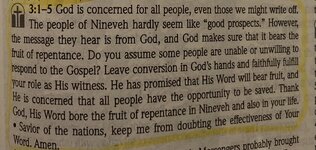1 John 5
Jesus said that all sins are forgivable except for blasphemy of the Holy Spirit, neither in this age or the one to come. I believe that's what John is warning about here and what Hebrews warns about in a couple of places. If you blaspheme the Holy Spirit, it's over. There is no forgiveness for it.
Whenever someone tells me that we can't know if we're saved, or when they make some stupid argument against the Bible and it's sufficiency, I simply point them to this verse and tell them they don't believe in the Bible, what the Apostles taught. These things have been written so that you who believe in Christ may know (not guess, hope, wonder, doubt) that you have eternal life.13 These things I have written to you who believe in the name of the Son of God, so that you may know that you have eternal life.
This is a prominent passage in the Protestant/Catholic dialectic. The Catholic view is that this passage teaches that there are two kinds of sin, mortal and venial. Mortal sin destroys the grace of Justification and Venial sin hurts your relationship with God but does not destroy it. If you commit a mortal sin, you will be damned if you die, but you can still regain Justification through the sacraments, enter a state of grace again and thus be saved. The textual problem with that is that John precludes the possibility of "reentering a state of grace" in verse 16 when he says "do not make request for this." In other words, don't even pray for this.16 If anyone sees his brother committing a sin not leading to death, he shall ask and God will for him give life to those who commit sin not leading to death. There is a sin leading to death; I do not say that he should make request for this. 17All unrighteousness is sin, and there is a sin not leading to death.
Jesus said that all sins are forgivable except for blasphemy of the Holy Spirit, neither in this age or the one to come. I believe that's what John is warning about here and what Hebrews warns about in a couple of places. If you blaspheme the Holy Spirit, it's over. There is no forgiveness for it.
As Paul said in Romans 8, the inner man, the new man, the Regenerate heart does not sin. But we all still sin experientially. That is the old man in us, our weakness. That sin, that weakness, is not imputed to us because in Christ we are regenerate and the Spirit is sanctifying us. God is keeping us and the devil can't take us away, in fulfillment of Jesus' prayer to the Father in John 17:15. This is why we don't believe that you can "lose your salvation." For we would also have to believe that Christ's prayer is worthless, that God is not able to keep us, and that the devil can snatch us from His hand. All utter impossibilities.18 We know that no one who has been born of God sins; but He who was begotten of God keeps him, and the evil one does not touch him. 19We know that we are of God, and that the whole world lies in the power of the evil one.
If you are not trusting in Christ alone to be your God and Savior then you are still trusting in idols. Smash the idols and treat Christ as Lord of your hearts.20 And we know that the Son of God has come, and has given us understanding so that we may know Him who is true; and we are in Him who is true, in His Son Jesus Christ. This is the true God and eternal life. 21 Little children, guard yourselves from idols.

